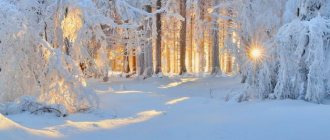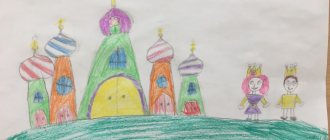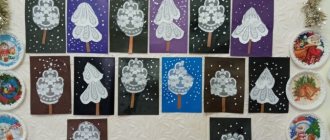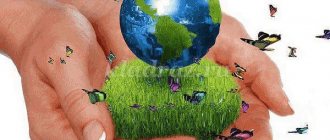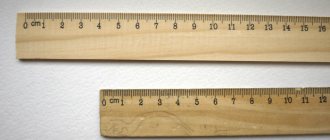Abstract of GCD on ecology in kindergarten in the preparatory group. Protect nature - our common home
Abstract of GCD on ecology in the preparatory group.
Topic: “Protect nature - our common home” Goal : Expand children’s understanding of natural objects and phenomena, flora and fauna, the relationship between nature and humans. Educational objectives: - create conditions for the development of cognitive interest in the natural world; — define the concept of “ecologist”, give a clear formulation; — formation of initial skills and habits of environmentally literate behavior that is safe for nature and for the child himself; — developing the ability to express one’s thoughts clearly for others. Educational objectives: - create conditions for nurturing a humane, emotionally positive, careful, caring attitude towards the natural world and the environment as a whole. Developmental tasks: - create conditions for the development of imagination, attention, thinking, and holistic perception of objects. Preliminary work: Reading the encyclopedia “Why and Why?”, reading fiction by V. Bianki “The Adventure of an Ant,” holding a conversation “Forest and Man,” an exhibition of drawings “Nature through the eyes of a child,” selecting poems to read by heart, designing a corner of nature. Age group: preparatory group, duration of educational activities: 25-30 minutes. Materials and equipment: Tape recorder with flash card;
a globe with a box, an image of Aibolit, a poster “Children’s behavior in the forest,” cards “How you should not behave in the forest,” paper stones with numbers, an anthill, sweet prizes for children, a basket, a candle, a plate, cotton swabs, a mood screen. Contents of OD:
1. Organizational moment. - Hello guys! Guests came to our class today. I propose to greet everyone: Invented by someone simply and wisely When meeting, say hello: “Good morning!” Good morning to smiling faces! Good morning to the sun and birds! Let everyone become kind and trusting. May the good morning last until the evening! 2. Motivation for educational activities. - Guys, today we have a very interesting job ahead of us, and for this you need to listen well, be attentive and active. - Children, would you like to find a treasure? - And what is it? (children's answers) - Correct. But there are things on earth much more valuable than gold and money. They cannot be spent; over the years they become more and more numerous. This is knowledge. It is for this treasure that we will go today. Difficulties and dangers await us, but we will definitely cope with them, because the good doctor Aibolit has come to your aid. 3. Setting the topic of the lesson by children. - Guys, look, Aibolit has a big box in his hands. Before you open it, listen to the riddle, and we will understand what lies there: Our entire Earth fits on it: Seas, oceans, Forests and fields. And you will find the North Pole there too, And if you want, you can carry it in your hands (the globe). - Guys, what is a globe? (Globe is a model of the Earth). — A globe is a model of our planet Earth. The globe was invented and made by people. By looking at it, we can learn a lot about our planet: for example, what is the shape of the Earth? (It is round and looks like a ball). — What color is land marked on the globe? (Brown, light brown, yellow, green.) - Is there a lot of water on our planet? (More water than land). - What color is it indicated on the globe? (Water is indicated by blue, light blue, and white colors). — Children, Doctor Aibolit tells me that our planet Earth is the most beautiful of all the planets we know. Only on Earth there is life and all the diversity of nature that we see: the sky, the sun, the moon, stars, clouds, air, mountains, rivers, seas, grass, trees, fish, birds, animals. And of course, we must love, appreciate and cherish all this beauty, all the wealth of nature. Do you think we need to protect nature on our planet Earth? -Now, during our conversation, we highlighted the main words: protection, nature, planet Earth. What do you think we will talk about in class today? -That's right, guys, today I invite you to go to the natural world. The topic of our lesson, as you guessed correctly, is called: “Protect nature - our common home.” 4. Didactic game “Living and inanimate nature.” “This world is so diverse and unique. Let's remember what nature is? Now we will play the game “Living and Inanimate Nature”. (The teacher pronounces words related to living and inanimate nature, and the children clap their hands if they hear something related to living nature). 5. Resolving a problem situation. - Children, look at the illustration. The guys picked a large bouquet of flowers for the teacher, but he was not happy, but upset. - Why, do you think? (children answer) - Guys, how should you behave in nature? (Don’t make noise, don’t leave the fire unextinguished, don’t pick flowers, don’t break branches, don’t touch birds’ nests.) Well done guys. You love nature. To truly love nature you need to know the rules. 6. Game “Name the signs correctly.” “I’ll show you the signs, and you explain what they mean.” Children: - Do not break trees and bushes - trees purify the air - Do not make fires - a fire may break out and all living things die - Do not leave garbage so as not to litter nature - Do not pick flowers - flowers decorate nature, bees and butterflies need them - Do not catch butterflies - they are beautiful, like flowers, weightless and vulnerable - Do not destroy the nests of birds - they delight us with their songs - Do not take home baby animals - the forest is a home for them - Do not destroy anthills - they remove all carrion, sewage and take everything underground . Therefore, the forest is always clean and fresh. 7. Reading poems about protecting wildlife. - Guys, you named everything correctly, I suggest you sit down on the chairs. Children, you know that our good doctor Aibolit treats animals, helps bugs, bunnies, he loves nature very much and takes care of it. You, too, are all kind and caring, you know a lot of poems about protecting wildlife, come out and tell us: 1. You can’t act so cruelly! You can't harm trees. Let them grow in the forest - bring goodness and beauty! 2. Don't play with a fire in the forest. Be careful about it. Before you light it, make a hole for it. 3. But there were Cellophane jars, pieces of iron, and bottles left around. You can’t leave them here! Let’s not be captivated, friends: There’s garbage here in the forest, it’s a stranger. We’ll take it with us. 4. There is no need to pick flowers in vain! And there is no need to trample them If you pick a flower If it’s all: both me and you, If we pick flowers Then the trees and flowers will be empty And there will be no beauty. 5. For hedgehogs and squirrels, the Forest is their home. They live there boldly And in summer and winter They find food to raise Their children And they don’t want to leave the forest at all. 8. Physical education minute. To the music, children perform exercises together with the teacher. 9. Game Path. - Oh, trouble, trouble, trouble. The ant hole disappeared, Someone stepped on the anthill, Then he filled it up with stones! - Guys, let's help the ants, put stones on the path. (children take stones, look at them, there are numbers on them from 1 to 10) Children, you not only need to restore the path, but arrange the stones in order from 1 to 10. So that the ants find their way home. Can you handle it? -I'm so happy for you guys. You helped the ants restore their path. 10. Learning new things. - Guys, nature knows how to feel. We cry when we are offended. And nature also cries when it is offended. How can you offend her - environmental pollution. And when we help nature, protect it, take care of it, it rejoices. Yes, guys, there is such a profession - ecologist. I have a “Magic Basket of Ideas”, let’s try to fill it like you think environmentalists do. (children guess) - Guys, that’s right, the dictionary says that - Ecologists study the state of water, land, air, the influence of industrial waste on plants, animals and humans. They have great knowledge about the animal and plant world; in the event of environmental disasters, ecologists try to find the best way out of current situations; they can work in laboratories, plant trees, shrubs, flowers, care for them, and clean them. Environmentalists love nature, help it and protect it. — Guys, who are ecologists? — What do you guys think, the beauty of nature depends on man? — It depends, because people plant forests, protect animals, feed birds, clean rivers. What kind of air is there? (Children: dirty and clean.) Is the air always clean? Where can you find dirty air? — Plants and factories that discharge toxic substances onto the soil harm nature and human health. All this pollutes the air. (Teacher lights a candle) What do you see? Children : The candle is burning. — Can flames pollute the air? After all, we see nothing but flames. Children: No, it can’t. - We'll check now. I'll take a plate and hold it over the flame for a little while. What appeared at the bottom of the plate? Soot. Take a cotton swab and rub it over the stain. What color did she become? Children : Black. — We made sure that the smoke settled on the plate. This is how it is in nature: smoke settles on our houses, cars and trees. Where does the smoke come from? Children: fires, factory chimneys. — How to protect the air from smoke? Children : Install filters on factory pipes, change fuel in cars. “If factories and factories and cars smoke like this, our bright world will lose its strength and beauty. We won't see a rainbow or sunshine. Do you want this? - What planet would you like to live on? Children: beautiful, colorful. 11. Summary of the lesson, reflection. - Guys, let's remember what we talked about today? Now please tell me, did you like our lesson? Look, I have cards with emotions laid out on my table. Choose a card with the same emotion that you still have after our lesson and put it in the magic box. - Remember what I told you - knowledge is a treasure, and we definitely found this treasure today, you learned a lot of new things, worked well and actively. Doctor Aibolit and I have prepared gifts for you: new magazines for the ecology group and sweet prizes for good brain activity - chocolate medals. Thank you for your attention!
Related posts:
Environmental education of preschool children. From work experience Summary of GCD in the preparatory group on ecology Summer time in kindergarten Diagnostic map of the development of children in kindergarten
Similar articles:
Summary of a lesson on ecology in the preparatory group. What does ecology study?
Summary of a lesson on ecology in the preparatory group. Theme: Water
Summary of a lesson on ecology in the preparatory group. Topic: Soil
Summary of a lesson on ecology in the preparatory group. Flower garden plants
Summary of a lesson on ecology in the preparatory group on the topic “Algae, mosses, lichens, ferns”
